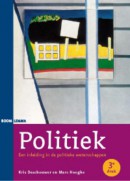Product informatie
- ISBN 9789089641076
- ISBN 10 9089641076
- Druk 1
- Bindwijze Paperback
- Taal Engels
- Uitgever Amsterdam University Press
- Onderwerp Politicologie
- Beschikbaar sinds 15 Mei 2009
Samenvatting
contents - 6[-]about the authors - 10[-]preface - 14[-]1 towards development policies based onlesson learning: an introduction - 16[-] 1.1 paradigm shifts - 17[-] 1.2 globalization - 20[-] 1.3 at the beginning of the 21st century: elements fordevelopment policies based on lesson learning - 23[-]2 twenty-first century globalization,paradigm shifts in development - 28[-] 2.1 twenty-first century globalization - 28[-] 2.2 turning points - 30[-] 2.3 new development era - 31[-] 2.4 international development cooperation - 41[-]3 does foreign aid work? - 48[-] 3.1 introduction - 48[-] 3.2 what aid are we talking about? - 49[-] 3.3 challenges in trying to assess the impact of aid - 52[-] 3.4 does aid work? the evidence - 55[-] 3.5 constraining aid\'s greater impact and how theseconstraints might ... be addressed - 66[-] 3.6 concluding comments: aid and the wider perspective - 71[-]4 under-explored treasure troves ofdevelopment lessons: lessons from thehistories of small rich european countries - 82[-] 4.1 introduction: lessons from history, or rather the\'secret history\' - 82[-] 4.2 agriculture - 87[-] 4.3 industrial development - 90[-] 4.4 corporate governance and the concentration ofeconomic power - 96[-] 4.5 social and political factors - 98[-] 4.6 concluding remarks - 100[-]5 stagnation in africa: disentanglingfigures, facts and fiction - 108[-] 5.1 stagnation in sub-saharan africa - 109[-] 5.2 the low social development cause - 112[-] 5.3 the not-a-nation-state cause - 114[-] 5.4 the dependence on raw material exports cause - 116[-] 5.5 the greedy politicians cause - 117[-] 5.6 the weak states and weak policies cause - 119[-] 5.7 the washington consensus cause - 120[-] 5.8 other traps and curses - 124[-] 5.9 conclusions and consequences - 126[-]6 including the middle classes?latin american social policies after thewashington consensus - 138[-] 6.1 the isi period and the origins of social policy regimes - 139[-] 6.2 the debt crisis and the washington consensus - 140[-] 6.3 neoliberalism and its failures - 141[-] 6.4 turn to the left and basic universalism? - 145[-] 6.5 the role of the middle classes - 149[-] 6.6 lessons for development policy and external support - 151[-]7 imaginary institutions: state-building inafghanistan - 158[-] 7.1 the afghan state and the dynamics that affect it - 159[-] 7.2 the nature of the state-building effort inafghanistan - 164[-] 7.3 how the \'international community\' responds - 166[-] 7.4 some concluding remarks - 171[-]8 beyond development orthodoxy:chinese lessons in pragmatism andinstitutional change - 178[-] 8.1 buried under development? - 178[-] 8.2 on land and institutions - 181[-] 8.3 chinese pragmatism: colored cats or the demise ofideology? - 184[-] 8.4 implications of chinese development: someconcluding observations - 194[-]9 business and sustainable development:from passive involvement to activepartnerships - 212[-] 9.1 introduction: from uniform to pluriformdevelopment thinking - 212[-] 9.2 from a traditional to a new development paradigm - 214[-] 9.3 from macro to micro: the role of multinationals insustainable development - 217[-] 9.4 from general to specific: strategic management ofcorporations and poverty alleviation - 220[-] 9.5 from passive to active: the search for partnerships - 227[-] 9.6 conclusion: the challenges ahead - 229[-]10 why \'philanthrocapitalism\' is notthe answer: private initiatives andinternational development - 238[-] 10.1 private initiatives - what kind and how much? - 240[-] 10.2 ngo initiatives - 242[-] 10.3 institutional philanthropy - 245[-] 10.4 common problems: impact and accountability - 249[-] 10.5 conclusions and implications for development policy - 250[-]11 the trouble with participation:assessing the new aid paradigm - 256[-] 11.1 participation: on the main menu
Meer boeken van uitgever Amsterdam University Press
Meer boeken met de onderwerpen Politicologie
Veel gestelde vragenmeer antwoorden
Hoe werkt Resale.nl?
Je kunt op de website advertentie(s) plaatsen van de boeken die u wilt verkopen. Een potentiële koper neemt dan contact met je op om samen een prijs af te spreken en de transactie verder af te handelen. Houdt hierbij onze aanbevelingen voor een veilige transactie in gedachten en voorkomt dat je slachtoffer wordt van oplichting.
Hoe kom ik in contact met de verkoper?
Je kunt een reactie versturen door bij de betreffende advertentie van de verkoper op de knop ‘doe een bod’ te drukken. Je kunt nu een bod doen op de advertentie en een persoonlijk bericht toevoegen. Het verstuurde bod brengt je in contact met de verkoper via e-mail.
Wat zijn de kosten voor het verkopen van mijn studieboeken?
Je kunt geheel gratis gebruik maken van de diensten van Resale.nl. Resale.nl haalt zijn inkomsten uit advertenties.
Hoe kan ik een boek kopen?
Resale.nl werkt globaal op de volgende manier:
- Zoek via het zoekveld het studieboek dat je wilt kopen.
- Uit de zoekresultaten kies je het studieboek waar je geïnteresseerd in bent.
- Op de detailpagina van het studieboek kun je een overzicht vinden van de personen die het studieboek verkopen.
- Je kunt nu een bod plaatsen door op de button te klikken. Het bod wordt via e-mail aan de verkoper verzonden.
- De verkoper van het studieboek neemt contact met je op door een reactie te geven op het bod dat je hebt verzonden. Met de verkoper kun je gezamenlijk een prijs afspreken. Houdt hierbij onze aanbevelingen voor een veilige overdracht in gedachten en voorkom dat u slachtoffer wordt van oplichting.
Hoe weet ik wat ik koop?
Om te achterhalen of wat je koopt ook daadwerkelijk is wat er wordt geadverteerd is het verstandig om bij de verkoper langs te gaan en het aangebodene te bezichtigen. Doe je dit niet, dan loopt je een zeker risico. Onder het kopje ‘Hoe kan ik de kans op misbruik verkleinen’ kun je meer over dit onderwerp vinden.
Kopers over Resale.nl
bart van gijsel
"Ik ben erg tevreden over deze verkoper de familie thus. Goede snelle levering."
Patrice Michel
"De verkoper heeft er alles aan gedaan om het door mij bestelde product zo snel mogelijk naar mij toe te krijgen. Heeft me van iedere stap op de hoogte ..."
marjolein
"Besteeling snel bezorg, in goede staat net zoals beschrijving en goede communicatie met verkoper!"
marjolein
"Goed contact, snel en in goede orde ontvangen. Staat van het boek was zo goed als nieuw!"
hilda1
"goede medewerking en hulp dank u wel"
Tineke
"Het bestelde werd netjes en snel afgeleverd. De prijs was goed."
stacy
"Goed verpaktBoek ziet er mooi uit"
elisa
"Goede levering alleen jammer dat er niet bij was gezet dat er al in geschreven was"
Elly
"Verkoper reageerde snel op mijn emails en heeft ook het boek snel opgestuurd.Het boek was niet van nieuw te onderscheiden. Was waarschijnlijk niet gebruikt. ..."
Gerard+[2]
"Prettig contact gehad en goed zaken kunnen doen."
















